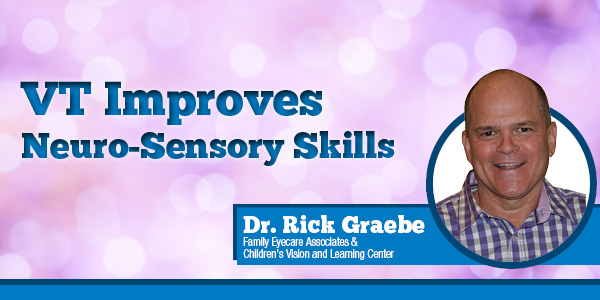VT Improves Neuro-Sensory Skills
Although many of us take it for granted, reading is actually a complex skill. The easy part is eyesight. Can you see the words on the page? Often, glasses can correct this deficiency.
But as Dr. Rick Graebe, a behavioral optometrist in Versailles, points out, many schoolchildren who have 20-20 eyesight still struggle to read. And reading comprehension is the foundation of nearly all classroom learning.
To master reading, the visual system, which includes the eyes, brain and body, must accomplish multiple tasks.
Do the eyes track words across the page? Do they point in together? Can they distinguish direction and tell the difference between b’s and d’s, for instance?
Can the reader sound out each word and visualize it by making a picture in his head? For an accomplished reader, a book becomes a movie that plays in the reader’s mind.
But for far too many students, this process is a struggle. What are the symptoms?
Some are obvious, Dr. Graebe says. School and reading avoidance. Headaches. Rubbing of the eyes. Even clumsiness can be a symptom.
“Most parents know their child well,” Dr. Graebe says. “If your bright child is not reaching his potential, that’s a warning sign.”
For more than three decades, Dr. Graebe has offered a solution: Vision Therapy, which is a kind of physical therapy for the eyes, brain and body.
An eye exam in Dr. Graebe’s office goes well beyond the eye chart. Children are tested while reading to see if their eyes are tracking, pointing in together and focusing on the words on the page. Because norms exist for these skills, Dr. Graebe can render an informed diagnosis and treatment plan.
Vision Therapy consists of non-academic activities like puzzles and games that kids actually enjoy. For instance, a child wearing colored glasses might walk on a line on the floor. Can he read an eye chart while walking? Or catch bean bags or count backwards by three’s?
These exercises help integrate the senses.
“We don’t do tutoring,” Dr. Graebe says. “We’re making brain changes, improving neuro-sensory skills that give kids what they need to be successful students. By building new pathways to the brain, these skills can last a lifetime.
“At the end of the day, this is what healthcare should be about, making lives better. I see kids blossom. My passion is to see people use the gifts that they’ve been given.”

